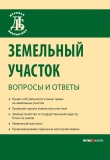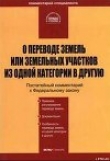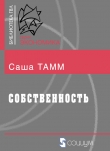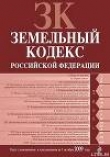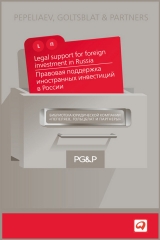
Текст книги "Правовая поддержка иностранных инвестиций в России"
Автор книги: авторов Коллектив
Жанры:
Ценные бумаги, инвестиции
,сообщить о нарушении
Текущая страница: 15 (всего у книги 17 страниц)
On certain cases of profit taxation on payment of dividends to foreign investors
The Russian Federation has concluded treaties with a number of states to avoid double taxation. The legal mechanisms envisaged by these treaties are called on, in particular, to ease the tax burden on companies implementing major investment projects outside their own countries. The problem of such mechanisms actually functioning is of fundamental significance for the Russian economy, since the inflow of foreign investment depends on it being resolved.
Foreign legal entities as foreign investors often launch their operations in Russia by setting up subsidiary organisations, usually in the form of a limited liability company. In this connection, we intend to consider the possibility of tax concessions being applied to the taxation of dividends paid by subsidiary organisations to foreign investor companies.
Let us take specific examples of relevant inter-governmental relations.
In accordance with article 309 of the Tax Code of the RF, incomes received by a foreign company that does not operate through a permanent establishment in the RF are subject to tax withheld at the source of payment. Subclause 1, clause 1 of this article includes dividends paid to a foreign organisation among such incomes. In this case, the tax is withheld by the Russian tax agent company that pays the income to the foreign participant.
Subclause 2, clause 2, article 284 of the Russian Tax Code establishes that a profit tax rate of 15 % is to be applied to incomes received by a foreign company in the form of dividends from a Russian one.
At the same time, according to clause 3, article 310 of the Russian Tax Code, in the event of payment of incomes that, under international treaties (agreements), are taxed in the RF at a lower rate, calculation and payment of the tax at the lower rate is permissible on the condition that the foreign company supplies the tax agent with confirmation of its location in the foreign state with which the RF has signed a Treaty on Avoidance of Double Taxation.
Let us consider, as an example, the rules contained in the Double Tax Treaty between the Russian Federation and the Federal Republic of Germany relating to taxes on income and property, dated 29 May 1996. According to clause 1, article 10 of the Treaty, dividends paid to a German participant are subject to profit tax in the RF at a rate of 5 or 15 %. The 5 % rate applies if the German company “owns at least ten per cent of the authorised or share capital of the company paying the dividends and this stake in the capital amounts to at least 160 000 German Marks or the equivalent sum in Roubles”. The 15 % profit tax rate applies in all other cases. Letter of the Ministry of Taxes and Levies of Russia (MTL) No. 23-1-10/9-419@ of 6 February 2004 “On Application of the Treaty between the Russian Federation and the Federal Republic of Germany on Avoidance of Double Taxation in relation to taxes on income and property, dated 29 May 1996” establishes that, from 1 January 2002 onwards, the minimum stake for application of the 5 % profit tax on dividends would amount to 81 806.7 Euros.
Let us build a model of a specific situation. Assume that the participant in a limited liability Russian company (Company 1) is a resident of Germany (Company 2). The authorised capital of Company 1 at the time of its creation amounts to 100 thousand roubles. Subsequently, however, net profits are used to increase the authorised capital to 4 million roubles. Can the dividends paid by Company 1 to Company 2 be taxed at the preferential 5 % profit tax rate?
If Company 2 is the only participant in Company 1, the first condition for application of the 5 % rate is fulfilled.
If the authorised capital of Company 1 equals 4 million roubles, this means that it exceeds the size of the stake required for application of the 5 % rate. Thus, all the conditions established by the Treaty for application of the 5 % profit tax rate may be regarded as having been fulfilled. Considering the above, we believe it lawful to apply the preferential profit tax rate to the incomes of Company 2 received from Company 1 in the form of dividends.
At the same time, application of the 5 % profit tax rate is, in the situation under review, fraught with a certain task risk.
Letter of the MTL of Russia of 6 February 2004 made public the co-ordinated position of the Ministries of Finance of Russia and the FRG on the procedure for applying the provisions of clause 1, article 10 of the Treaty, pointing out that the condition of a minimum stake by the German participant in the capital of the Russian company required for application of the reduced profit tax rate “must be observed at the time the initial investment is made and is not subject to annual recalculation at the time of dividend payment”. In our opinion, the letter might be interpreted by the tax inspectorate as follows: the requirement for a minimum stake must be fulfilled by Company 2 at the time Company 1 is founded, since the contribution to the authorised capital on establishment of Company 1 is the “time the initial investment is made”, and no subsequent increase in the authorised capital should be taken into account for the purpose of calculating the stake of Company 2 in the capital of Company 1.
If the provisions of the Treaty were interpreted thus by the tax authorities, application of the 5 % tax rate to Company 2’s dividends would be deemed unlawful, since the authorised capital of Company 1 when it was founded amounted to 90 thousand roubles, which does not comply with the minimum stake set by clause 1, article 10 of the Treaty. The tax office could justify application of the provision of the MTL of Russia letter on the basis that the letter provides information about an agreement between the Ministries of Finance of Russia and Germany, which the Treaty recognises as competent bodies and which, in pursuance of article 25 of the Treaty, have the right to agree on the procedure for applying the Treaty and on the interpretation of its provisions.
In spite of the circumstances described above, in our opinion, in the event of a dispute with the tax office concerning justification for Company 1 applying the 5 % tax rate to the dividends of Company 2, a qualified judicial representative would be able to ensure an positive outcome of the arbitration for the taxpayer.
This opinion is based on the following. As already noted, the Treaty does not set the time when the condition concerning the minimum stake in the capital of the subsidiary sufficing for application of the 5 % tax rate to dividends should be met. For this reason, if, at the time when the subsidiary is set up, this condition is not fulfilled, application of the reduced tax rate becomes lawful when the stake is raised to the level set by the Treaty. The position of the Ministries of Finance of Russia and Germany, as set out in the letter of the MTL of Russia, should be applied by the tax authorities and the courts in combination with the given provisions of clause 1, article 10 of the Treaty.
We believe that it does not follow from the content of the letter of the MTL of Russia that the Ministries of Finance of Russia and the FRG have restricted application of the 5 % tax rate on dividends only to cases when the minimum stake is achieved at the time the subsidiary is set up. This is confirmed by the literal sense of the letter’s provisions, which speaks precisely of the time “the initial investment is made”, not the time of initial investments. There is a subtle difference in these wordings, in that the letter determines only the time at which the condition on the minimum stake should be fulfilled, and does not exclude the possibility of taking all subsequent investments into account when determining the minimum stake. If a subsequent increase in the authorised capital should not be taken into consideration in calculating the minimum stake, this restriction should be determined as the time the first investment is made, thus limiting the possibility of counting all subsequent investment in the capital of the subsidiary company.
Confirmation of this may also be found in letter of the Ministry of Finance of Russia No. 04-06-05/1/30, dated 23 May 2003. In response to a private question posed by a taxpayer about application of the provisions of the Treaty with the FRG, the Russian Finance Ministry indicated that “in the memorandum on mutual understanding of 26 September 2001 on aspects of application of the Treaty on Avoidance of Double Taxation between Russia and Germany, clause 1 confirms the understanding that observance of the condition of a minimum stake (160 thousand German Marks or the equivalent sum in Roubles) at the time the investment is made is sufficient for implementation of the provisions of clause 1, article 10 of the Treaty”.
It is clear from this answer that the position of the Ministries of Finance of Russia and the FRG is that, if the minimum stake condition is met, a subsequent reduction in the foreign company’s stake in the capital of the subsidiary company does not preclude the right to apply the 5 % tax to dividends paid by said company. This position derives, primarily, from the objective of protecting foreign investments against possible foreign currency exchange rate fluctuations.
Finally, our arguments are also confirmed by the provisions of the Memorandum of mutual understanding to which the Russian Finance Ministry refers in its letter. This Memorandum has not been officially published in the RF, so the possibility of applying it in the event of a judicial dispute is open to doubt. At the same time, the rules of the Memorandum allow the will of the parties to the Treaty to be determined with respect to the question of applying the minimum stake condition. The section of the Memorandum setting out the positions of the Russian and German Finance Ministries concerning application of the provisions of the Treaty on taxation of dividends runs as follows: “The question was again discussed as to whether it was necessary to observe the requirements envisaged in article 10, paragraph 1а) of the Treaty on Avoidance of Double Taxation concerning the minimum stake in the amount of 160 thousand German Marks or the corresponding sum in Russian Roubles at the time of investment or each year at the time dividends are paid. Bearing in mind the intention behind the given provision, the parties have agreed that it will be sufficient to observe the requirement on a minimum stake only at the time of investment”.
The arguments presented prompt the following conclusion. The Ministries of Finance of Russia and the FRG have agreed that the minimum stake condition required for application of the 5 % tax rate to dividends may be fulfilled at the time the investments are made. This does not deprive the investor of the right to take account of subsequent investments when calculating its minimum stake.
Contributions to authorised capital constitute a type of investment (clause 1, article 1 of Law of the РСФСР No. 1488-1 of 26 June 1991 “On Investment Activity in the RSFSR”). Acquisition of a more than 10 % stake in the authorised capital of a Russian company is counted as direct foreign investment (para. 3, clause 1, article 2 of Federal Lawn No. 160-FZ of 9 July 1999 “On Foreign Investments in the Russian Federation”). The second paragraph of article 6 of the Law establishes that “assessment of capital investment in the authorised (share) capital of a foreign-invested company shall be made in compliance with the legislation of the Russian Federation”.
Thus, an increase in the authorised capital of Company 1 out of net profits constitutes foreign investment, which may be taken into account in calculating the minimum stake for the purposes of applying the 5 % tax rate to profits. If the investor allocates the net profits, as permitted by the legislation of the RF, for increasing the authorised capital of a company, it thus rejects its right to receive dividends from this net profit. In fact, allocation of net profits for increasing the authorised capital means assigning the investor the right to dispose of the net profit. By handing this right over to the enterprise, the founder is making an investment.
In connection with the above, it is quite lawful in the situation under review for Company 1 to apply the 5 % profit tax rate to dividends paid to Company 2.
Let us also note that the given position complies fully with the main objective of the legal regulation of all corresponding treaties on avoidance of double taxation – to improve the investment climate in the country to the maximum. Analysis of other international double taxation treaties concluded between the Government of the RF and governments of other countries and containing a condition for application of a preferential tax rate to dividends of foreign countries, depending on their participation in a Russian enterprise, makes our conclusion even more evident and applicable to other foreign investors in situations analogous to that under consideration.
Thus, the Treaty between the Russian Federation and the Republic of Cyprus on avoidance of double taxation in relation to taxes on income and capital, dated 5 December 1998, envisages in subclause 2, article 10 the possibility of applying a 5 % rate in taxing dividends received by a Cyprus company if it has invested in the capital of a Russian legal entity a sum equivalent to at least 100 thousand US dollars. As in the case with Germany, the text of the Treaty does not indicate that application of the preferential rate is lawful only when the given sum is contributed by the foreign investor at the stage of founding the Russian organisation. At the same time, the Russian Finance Ministry, expressing a position agreed with the Finance Ministry of the Republic of Cyprus with respect to application of a special tax regime to dividends, in letter No. 23-1-10/4-497@ of 12 February 2004 noted once more that “the given condition must be observed at the time the initial investment is made and is not subject to annual recalculation at the time of dividend payment”. Further on in the text, however, the letter states that “direct investment” in capital presupposes, in particular, acquisition of shares of both the initial and subsequent issues, as well as purchase of shares on the securities market or directly from a former owner. This circumstance indicates that, neither during conclusion of the relevant Treaty, nor during drafting of clarifications later on concerning the procedure for applying its individual provisions, did the representatives of the signatory parties intend to restrict the time of determining the volume of the foreign investor’s participation in the capital of the Russian company to just that when the latter was founded.
Several more treaties with foreign states (with Australia of 7 September 2000, the Netherlands of 16 December 1996, Morocco of 4 September 1997, Armenia of 28 December 1996, SAR of 27 November 1995, Croatia of 2 October 1995, Luxembourg of 28 June 1993, Vietnam of 27 May 1993, Lithuania of 29 June 1999) provide for applying a reduced tax rate to dividends paid by a Russian company in favour of corresponding foreign investors, without taking into account not only their percentage stakes, but also the specific amounts invested. Even though the foreign investor’s stake, the tax rate applied and the wording of the relevant provisions in the treaties mentioned do not always coincide, the overall sense of the regulation established is that, in deciding whether a preferential tax regime can be applied, it is lawful to proceed from the total volume of investment at the time these investments are made.
This approach is also reflected in letter No. 04-06-05/т.1/3 of the Ministry of Finance of Russia of 22 January 2002, which, in answer to a private question, explains the procedure for assessing the stake of a company resident in Luxembourg in a Russian joint stock company. In the letter, the Head of the Department for Tax Policy of the Russian Finance Ministry stated that, for the purposes of application of clause 2, article 10 of the Treaty between Russia and the Principality of Luxembourg, which establishes the condition for preferential taxation, the stake of the dividend recipient in the authorised capital of the Russian company is assessed at the time the actual investment is made.
Separate mention should be made of the Double Taxation Treaties concluded by the Russian Federation with the Republic of Finland of 4 May 1996, the Swiss Confederation of 15 November 1995, as well as Sweden of 15 June 1993, which, like the treaties considered above, envisage a differentiated tax rate for dividends. Legal entities residing in the foreign states listed and investing in the Russian Federation by setting up Russian subsidiary companies fall within the lowest risk group, provided they observe the conditions for preferential taxation of the dividends they receive. This is because the given treaties define the time when the size of the foreign investor’s stake in the capital of the Russian company is determined as that when dividends are accrued and paid.
A. Tereschenko, Senior Attorney E. Roletr, Attorney Pepeliaev, Goltsblat & Partners
Crediting of foreign investors and taxation of the incomes of credit organisers
A common practice of foreign investors in implementing investment projects in the Russian Federation is to obtain credit from the European Bank for Reconstruction and Development (EBRD), the International Finance Corporation (IFC), as well as foreign credit institutions operating in Russia. Such credits often serve as the basis for large scale investment plans, such as construction of a major production facility, pursuit of an advertising campaign, etc.
How is the interest income paid by the foreign investors to the EBRD, IFC and foreign credit institutions taxed?
Let us consider cases when the crediting party is a foreign credit institution (or foreign non-banking institution). In accordance with article 309 Tax Code of the RF, incomes received by a foreign organisation that does not operate through a permanent establishment in the RF are subject to tax withheld at the source of payment. Subclause 3, clause 1 of the article includes interest income from debt instruments of any type in such incomes.
In pursuit of subclause 4, clause 2, article 310 of the Tax Code of the RF, in the event of payment of incomes that, in accordance with international agreements (treaties), are not subject to taxation in the RF on the condition that the foreign organisation provides the tax agent with confirmation of its location in a foreign state with which the RF has a Double Taxation Treaty, no tax is withheld or paid by the tax agent that is the source of the income payment.
In accordance with clause 1, article 312 of the Tax Code of the RF, if the foreign organisation that is entitled to receive the income provides relevant confirmation before the income is paid, the tax agent is granted either release from withholding the tax or the right to levy a lower tax rate.
Let us assume that the organisation granting the credit to the foreign investor (the Company) is a Swiss bank or Swiss subsidiary of a credit institution (the Creditor) of some third country. The Creditor is thus, as recipient of the income under the credit agreement with the Company, a resident of Switzerland.
On 15 November 1995, a Treaty “On Avoidance of Double Taxation in Relation to Incomes and Capital” was concluded between the RF and the Swiss Confederation. According to article 11 of the Treaty, interest paid to a resident of Switzerland is subject to profit tax in the RF at a rate of 10 %, while interest paid to a Swiss bank is taxed at a rate of 5 %.
If the Creditor is not a credit institution, the 10 % tax rate is applied to the interest income paid in its favour. The tax at this rate is to be withheld by the Company. In order to be entitled to this tax rate on its profit, the Creditor must supply the Company with confirmation of its location in Switzerland.
If, however, the Creditor is a credit institution, on the condition of confirmation of its status to the Company, profit tax may be withheld at a rate of 5 %. The Tax Code of the RF does not determine which documents might constitute proof of the special status of a non-resident company for the purpose of applying the Double Tax Treaty. According to letter No. 15–06/44668 of the Inspectorate of the Ministry of Taxes and Levies for the city of Moscow of 15 September 2000, in order to qualify for application of the 5 % profit tax rate, a Swiss credit institution is required to provide the Russian company with “duly drawn up copies of documents confirming that it is in the banking business in accordance with the legislation of Switzerland”. Confirmation that the given foreign legal entity is a bank may consist of its inclusion in the international Bankers’ Almanac (published by Reed Information Services, England) or the international catalogue International Bank Identifier Code (published by S.W.I.F.T., Belgium & International Organisation for Standardisation, Switzerland).
In our opinion, other documents may be used as confirmation of the status of the foreign company as a credit institution, such as a banking licence issued by the relevant authority in Switzerland, translated into Russian and duly notarised.
Situations might occur when an international organisation acts as creditor. In particular, an Agreement on permanent representation of the EBRD has been signed between the Government of the RF and the European Bank for Reconstruction and Development. According to article IX, section 21 of the Agreement, “the Bank, its assets, and activities, as well as the operations of the Bank and its Permanent Representation, shall be exempt from: a) any taxation and any liability to pay, withhold or collect any taxes or duties”.
By Resolution of the Government of the RF No. 397 of 17 April 1998 “On Conclusion of an Agreement between the Government of the Russian Federation and the European Bank for Reconstruction and Development on Application of the Provisions of International Treaties of the Russian Federation concerning Benefits and Privileges of the European Bank for Reconstruction and Development on the Territory of the Russian Federation”, the Agreement came into effect on 8 May 1998.
A similar rule exempting the EBRD’s incomes derived from granting credits to Russian organisations is established by clause 1, article 53 of the Agreement “On Foundation of the European Bank for Reconstruction and Development” of 29 May 1990.
An Agreement on a permanent representation of the IFC in the RF was signed between the Government of the RF and the International Finance Corporation and was ratified by Federal Law No. 134-FZ of 9 November 2004.
According to article VI of the Agreement: “the Permanent Representation, its assets, property, incomes, as well as its operations and transactions envisaged by articles of the Agreement, shall be exempt from any taxation (including mandatory payments, among them social ones, with respect to its officials and personnel) and all customs duties, on the understanding, however, that the Permanent Representation will not demand exemption from taxes constituting actual payment for specific services rendered and that the IFC will grant officials and personnel of the Permanent Representation who are Russian citizens and are not covered by social or other such IFC support remuneration conditions that will take into account the absence of such support”.
In pursuance of article 7 of the Tax Code of the RF, if an international treaty of the RF containing provisions on taxes and levies establishes other rules and norms than those envisaged by the Tax Code of the RF and regulatory and legal acts on taxes and (or) levies adopted in accordance therewith, it is the rules and norms of the international treaties of the RF that are applied.
Thus, in accordance with the given rules of the Agreements between the Government of the RF and the EBRD and between the Government of the RF and the IFC, the incomes of the EBRD and the IFC in the form of interest on credit agreements and other payments within the scope of credit agreements are not subject to taxation on the territory of the RF. Consequently, the borrower organisation (investor) is not required to withhold and pay tax on said incomes.
This conclusion is confirmed by the position taken by the tax authorities, as set out in letter No. 15–08/25264 of the Inspectorate for the Ministry of Taxes and Levies for the city of Moscow, dated 15 June 2000, as well as the private response by Russian Tax Ministry officials given in a letter on 15 February 2000.
The Tax Code of the RF does not set any special requirements for confirming the status of the EBRD or the IFC for the purpose of the Russian investor organisation (including one set up by a foreign investor) applying tax exemption. The tax authorities have no official position on this issue. In our opinion, the tax agent Russian organisation does not require any documents confirming the status of the creditor organisation in order to apply exemption from withholding profit tax, provided it follows from the credit agreement and payment documents that the creditor is the EBRD or the IFC.
The following conclusions may be drawn with respect to taxation of the incomes of the two types of organisation crediting foreign investors in Russia.
Payments in favour of a foreign crediting institution (or subsidiary thereof) located on the territory of a state with which the Russian Federation has a Double Taxation Treaty are subject to taxation in Russia at a reduced rate, if so envisaged in the Treaty and on the condition of confirmation by the crediting organisation of its location on the territory of the foreign state. If the crediting organisation is a credit institution, the profit tax rate is cut to 5 %.
Payments in favour of the European Bank for Reconstruction and Development and the International Finance Corporation are not subject to profit tax on the territory of the Russian Federation, so the borrower is not required to acts as a tax agent when paying the bank or the corporation interest income or other payments.
Correct and precise use of the tax concession mechanism can promote implementation of investment projects.
M. Kulkov, Head of Commercial and IP Practice Practice Pepeliaev, Goltsblat & Partners

